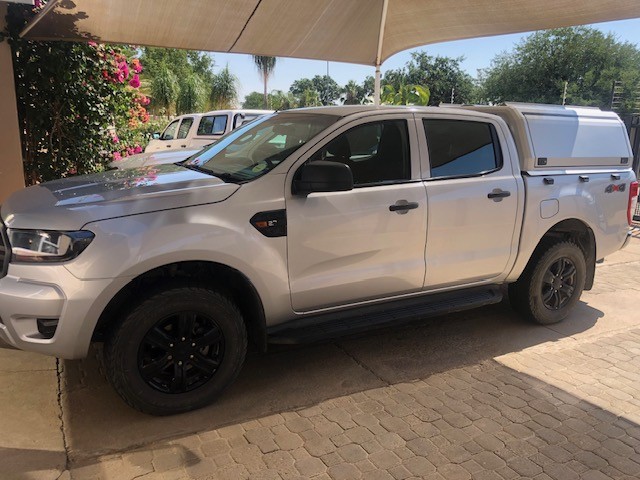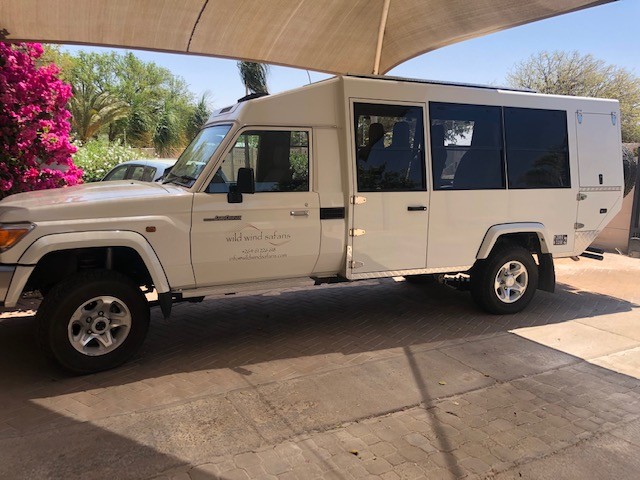Travel-Information
Dear guests, please note that effective of 01 April 2025, Namibia has implemented new VISA regulations, you will find more information on the official government website: Visa on arrival
Please ensure that you inform Wild Wind Safaris tour consultants in advance of any dietary requirements, preferences or food allergies that you have and we will pass this information on to the accommodation establishments so that they may cater for you accordingly. While on guided tour, most breakfasts and evening meals will be served at the lodge you are staying at or on camping tours in the camps.
Lunches are served in the restaurants between destinations or at picnic spots when on camping tour.
When water is included in the package of the tour, you will receive your own eco water bottle which can be refilled as you need.
Beverages whilst on tour are to be settled directly by guests with the lodges you are staying at.
Tea and coffee are offered by most accommodation establishments free of charge with meals and at afternoon tea time.
Both Namibian dollars and South African Rand are equal in value and are accepted as legal tender anywhere in Namibia.
When departing Namibia we recommend that any cash you take with you is in South African Rand as Namibian dollars are generally not easily exchanged outside of Namibia.
Visa and Master Card are accepted throughout Namibia, but American Express and Diners Club are not.
Most foreign currencies can be exchanged at bureaus de change at Hosea Kutako International Airport where rates are identical to those at the banks
VAT of 15 % is included on all items and VAT paid on items being exported can be reclaimed at the International Airport on departure.
There are no uniform times for opening and closing, and hours may vary from business to business and town to town.
Please note that the below guidelines may vary and that most businesses are closed on Sundays.
Banks - Weekdays: 09h00 – 15h30 Saturdays: 09h00 – 11h00 Sundays & public holidays: Closed
Shops - Weekdays: 08h30 – 17h00 Saturdays: 09h00 – 13h00 Sundays & public holidays: 09h00 – 13h00
Supermarkets - Weekdays: 08h30 – 19h00 Saturdays: 08h30 – 19h00 Sundays & public holidays: 09h00 – 18h00
Restaurants - Lunch: 12h00 – 14h00 Dinner: 18h00 – 22h00 Many restaurants close one day a week, usually a Sunday or a Monday, most kitchens closes at 22h00 and guests should place orders by 21h30
Electrical outlets in Namibia are 220 volt, 15 amp and have three round pins the same South African plugs.
Adaptors can usually be purchased in Windhoek when you arrive or at Heathrow/Gatwick/Johannesburg airports.
It is possible to recharge batteries at most lodges, tented camps, and guesthouses, and you are welcome to bring an adaptor to recharge batteries using the vehicle’s cigarette lighter socket.
English is the official language but Afrikaans and German are also widely spoken, as well as the various tribal languages and dialects belonging to the Bantu and Khoisan groups.
Namibia is on the same time as the rest of southern Africa.
Crime is no more prevalent in Southern Africa than anywhere else in the world, but as a tourist you are more likely to be targeted if you are not aware of your surroundings and taking reasonable care of your possessions.
Take normal precautions of not carrying all your valuables while walking about and preferably go with others, particularly after dark.
Keep any valuables locked in a safety deposit box at the hotel where you are staying. Never leave anything of value unattended under any circumstances, including lying visible inside a locked vehicle. Opportunistic crimes are as common here as anywhere else in the world.
Tipping and Gratuity is not included in any of our tours price & tipping is customary in Southern Africa, but a gratuity or service fee is not required by law and is certainly not compulsory.
If you would like to tip because you have received good service below is a brief guideline to assist you.
The below is indicated in USD, but in Namibia it is better to work on Namibian Dollars or South African Rand.
▪ Your guide on the tour - expected tipping of your Wild Wind Safaris expert guide is around US$ 10 per guest per day (if the guide has done a good job).
▪ Lodge guides or optional activity guides - we recommend to receive US$ 5 per guest per day/activity
▪ General camp/lodge/hotel & guesthouse staff - we recommend about US$ 5 per guest per day for general staff (camp crew, housekeepers, chefs, waiting staff etc). This should be placed in the communal tip box, generally located at reception, and will be distributed equally amongst all the staff at a later stage.
▪ Porters - we recommend US$ 2 per room delivered to.
▪ Waiters - in restaurants a tip of 10% to 15 % of the entire bill is customary, depending on the quality of the service.
▪ In accommodation establishments where meals are generally included in a package price, a tip is not necessary with the meal, but any tip you wish to leave should be put in the general ‘tip box’ at reception on departure.
▪ Officials and public servants - never tip or attempt to bribe an official or public servant. Report any requests for bribes to us and note that bribery is punishable by imprisonment.
Wild animals must be treated with caution and respect – they are not tame and any attempt to approach, touch or feed them is prohibited without consent from your guide. This is especially important near lodges or campsites where animals may have become accustomed to human visitors.
Please listen to your guides. The safety precautions need to be taken seriously and strictly adhered to.
Observe animals silently and with minimum disturbance to their natural activities. Loud talking on game drives can frighten animals away.
Never attempt to attract an animal’s attention. Do not imitate animal sounds, clap your hands, whistle, pound the vehicle or throw objects.
Please respect your guide’s judgment about proximity to animals. Do not insist to take the vehicle closer!
Litter tossed on the ground (including cigarette butts) can choke or poison animals and birds as well as being unsightly.
Refrain from smoking on game drives and in vehicles.
On camping tours please keep your tent zipped up or doors to you rooms closed when you are out to prevent unwanted visitors.
Always look where you walk and wear closed shoes when walking at night in case of scorpions or snakes
Traveler’s responsibility is to ensure that he/she is in good health and medically fit to undertake safari tour. If the tour passes through the malaria area, precautionary treatment is advised. Consultation with medical practitioner/doctor and obtaining prophylactic and precautionary anti-malaria treatment is necessary.
It is Traveler’s responsibility to obtain and be in possession of the comprehensive travel and cancellation insurance including medical insurance with provision for air evacuation, insurance in case of accidents, sudden sickness, medical expenses or death, before embarking on a tour. Our company is neither responsible nor liable for any claims, damage or loss as a result of Client’s failing to obtain necessary insurance cover.
Suggested packing list: For clothing items we would recommend cotton over synthetic fibers, and muted colours for game viewing (rather than white or bright colours). Please ensure you bring sufficient warm clothing if you will be on safari during our winter months (May to September) as temperatures are colder than most visitors anticipate. Temperatures at the coast can be cold anytime of the year so do bring at least one fleece even if on safari during our summer.
- Quality sunglasses (preferably polarized)
- Sun hat with wide brim
- Golf-shirts, T-shirts, long-sleeved shirts
- Shorts/skirts
- Long trousers
- Underwear (sports bra recommended on game drives as the roads can be bumpy and uneven) & socks
- Good walking shoes (trainers are fine)
- Sandals
- Swimming costume
- Warm fleece/sweater (especially in winter)
- Warm wind break, scarf & gloves for the cold winter months (May to September)
- Light rain gear for the summer months (November to April)
- Camera equipment & plenty of memory cards
- If you wear contact lenses we recommend that you bring a pair of glasses in case of irritation from the dust & dryness
- Binoculars
- Personal toiletries
- Malaria medication (if applicable)
- Moisturizing cream & lip salve
- Sunscreen lotion
- Insect repellent
- Basic personal medical kit (aspirins, plasters, imodium, antiseptic cream, anti-histamine etc.)
- Tissues/wet wipes
- Torch
- Waterproof/dustproof bags/cover for camera
Due to nature of the safari tour, rugged terrain and extremely dusty conditions, we would like to urge to carefully pack all sensitive photographic, electronic and filming equipment, preferably in the dust-proof bags.
Namibia has one of the loveliest climates in the world and it’s fine to visit all year round . Dry, sunny and pleasant most of the year, Namibia provides excellent opportunity to travel without worrying about the weather. Climate is classified as sub-tropical.
Country receives only a fraction of the rain experienced by countries further east or north Africa. Between about mid-November to March some days will be humid and rain may follow, often in localized afternoon thunderstorms.
April and especially May are often lovely months in Namibia. Increasingly dry, with a real freshness in the air, and much greenery in the landscape; at this time the air is clear and largely free from dust. From June to August Namibia cools down and dries out more; nights can become cold, dropping below freezing in some desert areas. As the landscape dries so the game in the north of the country gravitates more to waterholes, and is more easily seen by visitors at the national parks and nature sanctuaries. By September and October it warms up again; game-viewing in most areas is at its best, although there’s often a lot of dust around and the vegetation has lost its vibrancy.
November is a highly variable month. Sometimes the hot, dry weather will continue, at other times the sky will fill with clouds and threaten to rain, but if you’re lucky enough to witness the first rains of the season, you’ll never forget the drama.
On our tours we use:
For small groups - Ford Ranger or Toyota Hilux, 4x4, 5 seater with air conditioning.

For bigger groups - Toyota Land Cruiser, 4x4, 10 seater with air conditioning.

